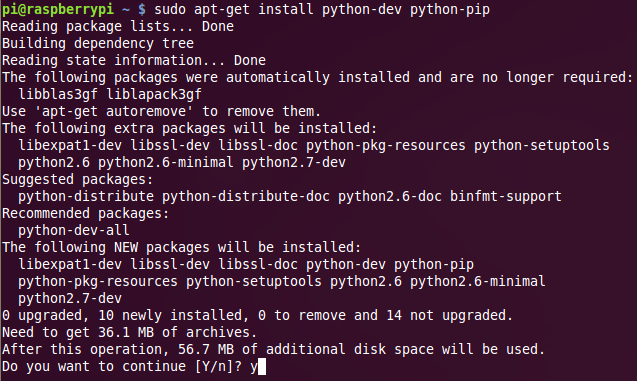
- #Macports python pip how to
- #Macports python pip mac os x
- #Macports python pip install
- #Macports python pip update
I am running a Macbook Pro 2011, with OSX 10.9 (Mavericks). If it's relevant when i run which python from the terminal window, i get the following result: /usr/bin/python I have tried to run the following in the terminal window: export PYTHONPATH=/Library/Python/2.7/site-packages:$PYTHONPATHīut this hasn't made any difference that I can see, and I am a little lost as to where to go from here.
#Macports python pip how to
I presume the problem is that IDLE is not linking to the new components, but I'm not sure how to resolved this.
#Macports python pip install
I have verified that numpy (and the other SciPy components) is installed, and is at the following location: /opt/local/var/macports/sources//release/tarballs/portĪlso if I try to use pip install numpy, I get the following: Requirement already satisfied (use -upgrade to upgrade): numpy in /System/Library/Frameworks/amework/Versions/2.7/Extras/lib/python I successfully downloaded and installed the SciPy packages, but when I try and import numpy (or matplotlib etc.) i get the following message: > import numpy


I recently decided to try and add the SciPy packages via Macports and have run into difficulty. I have installed the version 3.4 of Python from the main website, and have been accessing it via the IDLE application.
#Macports python pip mac os x
NumPy in IDLE (Python 3.3.2) on Mac OSx 10.8 Install Numpy on Mac OS X Lion 10.7 'pip27' is now active.As I know this seems to be a common question, I have looked at the other threads and can't seem to figure out how to apply to my own situation.
#Macports python pip update
Update 2014-04: MacPorts now does provide a port select pip option so you should no longer need to do the PATH hack. profile to add the Python framework bin directory at the head of the paths: export PATH=/opt/local/Library/Frameworks/amework/Versions/Current/bin:/opt/local/bin. Update: Until MacPorts provides a port select pip option (as requested in the MacPorts issue linked above), you should be able to have pip execute the MacPorts version by modifying your. If so, by default, you would see them with /usr/bin/python2.7 and/or installed in /usr/local/bin and /Library/Python/2.7. Perhaps you installed versions of these to the system Python 2.7. Warning: Unable to get active selected version: The specified group 'pip' does not exist.Įrror: The 'list' command failed: The specified group 'pip' does not exist.īTW, neither pip nor ipython are supplied by Apple with OS X system Pythons, so it's not clear what you mean by bundled OS X defaults. In general, MacPorts installs Python scripts with version-specific suffixes, so independent of port select options, you should find those commands with their suffix, for example: $ port select -list ipython MacPorts does provide port select options for some of the commands you mention like python and ipython but does not yet for pip. Without more information, it's hard to guess what behavior you are seeing and what you expect to see. Does anyone know what's going on here?Įdit: I should clarify that I don't consider this a complete fix - you're supposed to be able to change back to the Apple version with a command like sudo port select -set python python25-apple, which I suspect I'll only get back by solving the underlying problem.įor the record, the contents of ~/.profile: export PATH=/opt/local/bin:/opt/local/sbin:/usr/bin:/bin:/usr/sbin:/sbin:/usr/local/bin:/usr/X11/bin:/usr/texbin None (active) # shouldn't the bundled version be here?Ĭhanging the active port ( sudo port select -set python python27) solves the problem, but not all ports work with port select. I suspect the output of port select is a symptom: $ port select python

profile to make sure that /opt/local/bin came first in the PATH, but that hasn't solved the problem. This has had the side-effect that many of the ports I was using have gone back to their bundled OS X defaults.

For an easier life, I simply cleared out /opt/local/ and reinstalled the latest version of MacPorts, followed by the ports themselves. After upgrading to Mountain Lion, some of my MacPorts stopped working.


 0 kommentar(er)
0 kommentar(er)
